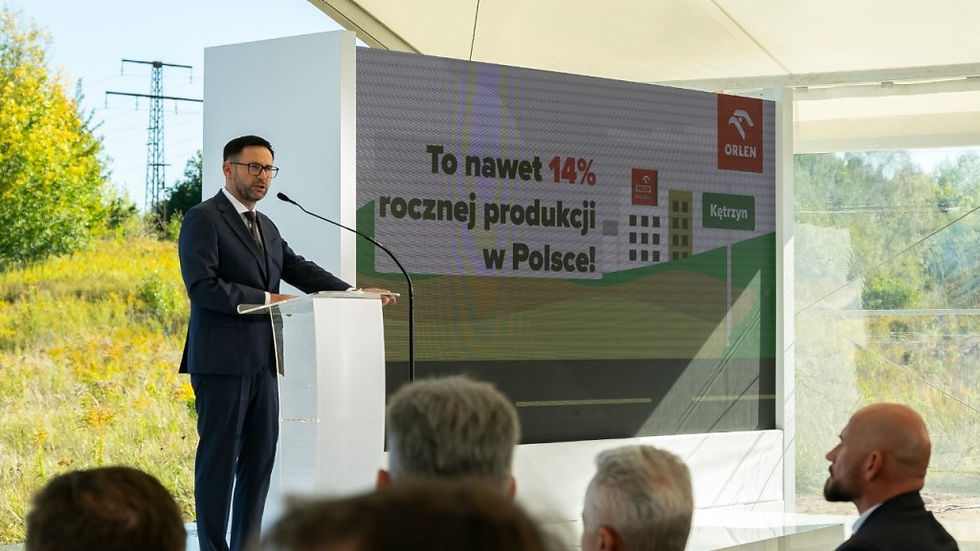Orlen Group to build new rapeseed-crush plant in Poland
- Orlen Group
- Sep 26, 2023
- 3 min read

Orlen Południe, part of the Orlen Group, has signed a contract for the construction of a state-of-the-art oilseed-processing plant in Kętrzyn, Poland.
The plant is set to process 500,000 metric tons of rapeseed annually, yielding a production output of 200,000 tons of oil for the purpose of manufacturing low-carbon biofuels.
This investment will not only generate employment opportunities but will also be a stable source of demand for Polish farmers cultivating the rapeseed crop.
“We have an ambitious strategy to advance our biofuel production capabilities, a commitment that underscores the Orlen Group’s aspiration to emerge as a dominant force in the regional biofuel sector,” said Daniel Obajtek, Orlen’s CEO and president of the management board. “To further this vision, we are actively investing in our refineries in Trzebinia, Jedlicze, Płock and Gdańsk. The most recent project will involve the establishment of our own rapeseed oil-pressing plant in Kętrzyn. With an annual processing capacity of 500,000 tons of rapeseed, this facility is expected to utilize a substantial portion, approximately one-seventh, of the total domestic output of the crop. In our pursuit of business objectives, the Orlen Group is dedicated to creating a conducive environment for sustained collaboration with Polish farmers, guaranteeing them a reliable outlet for the cultivated products. Also aligned with this commitment is our ongoing initiative involving the construction of a second-generation bioethanol plant in Jedlicze, set to consume 150,000 tons of locally sourced straw from agricultural producers per year.”
The pressing-plant project in Kętrzyn will entail an estimated total cost of approximately USD$195.5 million.
Its location has been influenced by the region’s remarkable agricultural potential and abundant availability of the raw material.
Construction of the facility will begin in the first half of next year, with completion expected by mid-2026.
In addition to the pressing plant itself, the complex will encompass various processing nodes, including facilities for raw-material reception and product dispatch, raw-material and product storage, pressing and extraction, process-steam production, and wastewater treatment.
The contractor responsible for the project will be a consortium of Polimex Mostostal S.A. and AB Industry S.A.
The plant is to produce an annual output of 200,000 tons of oil, with Orlen Południe having full control over the quality of the end product.
In order to produce this amount of oil, the processing plant will use about 500,000 tons of rapeseed sourced primarily from Polish agricultural producers.
In 2022, Poland’s rapeseed crop yielded a total of 3.6 million tons.
The Orlen Południe investment also heralds new prospects for the town and the wider region, the company stated.
The pressing plant alone will generate more than 100 new solid job opportunities, and its operation will stimulate demand for supplementary services that can be provided by local business.
Oil produced in Kętrzyn will meet the specifications required for use in the Orlen Group’s production facilities.
The principal consumer will be Orlen Południe, which operates a biodiesel plant in Trzebinia.
Establishment of the Kętrzyn oil-pressing plant underscores the Orlen Group’s commitment to strengthening its collaboration with Polish farmers.
Concurrently, a second-generation bioethanol plant is being constructed at the Jedlicze refinery, a pioneering development in Poland and the second of its kind in Europe.
This facility is to produce 25,000 tons of bioethanol annually, utilizing nonfood raw materials, primarily straw, sourced from Polish farmers in the quantity of 150,000 tons per year.
Biocomponents added to gasoline and diesel fuel play a role in diminishing reliance on petroleum, thereby bolstering energy independence and augmenting the diversification of raw-material sources for fuel production.
This also holds significant environmental benefits, as bioadditives are either derived from renewable agricultural resources or facilitate the efficient management of waste, including post-consumer frying oils.
The Orlen2030 strategy envisages that by the end of the decade the use of bioadditives in the Orlen Group will reach about 3 million tons per year.
To achieve this goal, the group is prepared to invest approximately USD$3.5 billion.






























